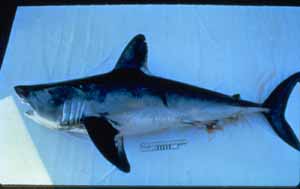|
By Harald Gay

|
A dead mackeral shark (Lamna nasus).
© Innerspace Visions / Shark-Foundation
|
|
The fact that on June 26, 2001, a school of almost 500 mackerel sharks (Lamna
nasus) landed in
the nets of Danish fishermen in the North Sea was a sensation for science and naturally also for
the daily press. However, while scientists were thrilled to discover that the once thought almost
extinct mackerel shark was again to be found in the region, the press concentrated on pushing the
panic button.
In the wake of the media uproar on the Florida shark incident reports, the real question posed by
reporters to scientists was - in my opinion -: "Are the beaches of the North Sea in danger
because of the "flood of sharks"? A marine biologist and scientist from the Federal Research
Office for Fisheries in Hamburg replied to a reporter's question on the catch of the Danish
fishermen 250 seamiles off the coast of Jutland as follows: "It's equivalent to a six in Lotto".
When Shark Info questioned the scientist he replied that this quote was cited out of context and
that he simply wanted to point out the probability of such a catch rather than underline the luck of
the fishermen.
However, the real explosive issue of this news did not come through in the headlines, for the
mackerel shark (Lamna nasus) is a seldom found guest in the waters of the North Sea and the
North Atlantic. The reason is that since the mid-70s, Norwegian fishing fleets called an all out war
on this shark species, putting it on the edge of extinction with their large catches! So according to
the press release it was sheer luck that Danish fishermen encountered such a large school of
these sharks. The fishermen took advantage of the opportunity and had a real go at them as
though they were in some kind of gold rush, massacring almost 500 mackerel sharks. A grim
welcome indeed.
It is not yet clear if they fished the sharks illegally with nets, which would explain the large catch.
According to current EU rights which are binding on all European fishing nations, mackerel sharks
may only be caught using long lines. Upon addressing the Royal Danish Fishing Office on this
question, the only reply received was that longline fishing in Denmark was not the usual practice
due to the minimal catch results. But fishermen are not required to provide data on catch, i.e. on
catch methods. The only information sought and registered in a databank are auction results and
related data on the amounts.
The reason for the unrealistic catch quota for mackerel sharks established by the EU lies in the
fact that a more detailed investigation of shark populations in European ocean waters is not
possible because of the obscure legal situation.
One Greenpeace activist and ocean biologist from the Wattenmeer Protection Station commented
very critically on this event. Their comparison, in my opinion, was very suitable: "It is as though
500 lions had been massacred in the Serengeti, with the one difference that in such a case
people would have been shocked and as a result would have initiated fund-raising drives to
improve protection of these animals."
Personally, I feel that the expression "meaningful usage of ocean resources" in this connection
has become a farce because it only serves to foster overexploitation and is equivalent to our
cutting the groove on the branch that we are sitting a little deeper. Once again my eyes were
opened to the fact that protecting species is not a remote problem but instead one which is found
directly on our doorstep.
* Harald Gay is correspondent for
Shark Info in Germany.
May be published only by indicating the source: Shark Info / Harald Gay
|

